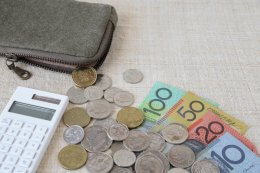
One in five Aussies will use any tax return refund to pay off debt this year, with new research from Compare the Market showing the decision could end up saving them thousands more in extra interest repayments.
A recent Compare the Market survey found 23% of Australians planned to use their tax refund to pay off debt, up from 19% last year.
It comes as the nation’s household liabilities increased by $37.4b within the last quarter, according to the Australian Bureau of Statistics.
Compare the Market Economic Director David Koch said that using extra cash to clear debt could be a great idea that could end up saving people hundreds, or thousands of dollars in the long run.
“If you have $1,000 in credit card debt in an account with an interest rate of 20% it will take you over nine years and cost you an extra $1,168 in interest repayments if you only make minimum repayments,” Mr Koch said.
“So while paying off debt might feel like a ‘boring’ option – it could actually help you reach your other financial goals faster.”
The data also showed 12% will put the money towards essential expenses, 7% will invest in shares, and 5% will put this money towards property.
Only 7% will spend their tax return on a holiday, and 2% are set to splash their cash on clothes and gadgets.
Compare the Market Economic Director David Koch said the cost of living crisis is still putting the squeeze on household budgets and discretionary spending.
“Retail sales have fallen to their lowest level since the pandemic,” Mr Koch said. “And it looks set to stay that way with almost half of Australians planning to save any tax return refund from July 1.
“While it’s great to see so many people planning for their financial future by saving, paying off debt and investing their tax return – the slump in retail sales also points towards a weakening economy.”
How will you spend your tax return? | Gen Z | Millennials | Gen X | Boomers | Total |
I get a tax payable | 1% | 3% | 1% | 1% | 1% |
Splurge on clothes and gadgets | 2% | 5% | 2% | 0% | 2% |
Invest in crypto | 5% | 7% | 1% | 0% | 3% |
Put it towards a house deposit | 12% | 8% | 1% | 0% | 4% |
Invest in shares | 10% | 13% | 5% | 1% | 7% |
Fund a holiday | 6% | 11% | 6% | 5% | 7% |
I expect to be owing tax | 5% | 5% | 10% | 8% | 7% |
Use it to pay for everyday expenses (groceries, bills) | 14% | 14% | 11% | 10% | 12% |
I won’t be lodging a tax return | 5% | 5% | 10% | 47% | 21% |
Pay off debt | 25% | 31% | 30% | 10% | 23% |
Put it into savings | 62% | 58% | 44% | 24% | 44% |
*Survey of 1010 adult Australians conducted in April 2024.
The generation that was most likely to save their tax return refund were the Zoomers (62%), following by Millennials (58%).
Millennials were also most likely to pay off debt (31%), pay for everyday expenses (14%), fund a holiday (11%), invest in shares (13%) and invest in crypto (7%).
Gen Xers were the most likely age group to be owing tax (10%) and were the least likely to invest in property or crypto.
Mr Koch said many working Australians would start to feel a bit richer when the stage three tax cuts come into effect on July 1.
“With unemployment on the rise and the economy slowing, the tax cuts could provide a great opportunity for Australians to rebuild their savings which were at record levels during the pandemic lockdowns but have been whittled down to virtually nothing since then.
“Some economists predict there will be a slight uplift in consumer spending and inflation because more tax cuts will go to lower and middle-income earners who tend to spend more than higher earners,” Mr Koch said.
“But the Reserve Bank refutes this argument, saying the tax cuts are broadly revenue neutral over four years and that the changes will help ease wage and inflationary pressures in a tight labour market.
“Inflation really forced the government to redesign the tax cuts. Someone earning $200,000 would have received a $9075 tax cut – but now they will get half of that.”
For more information, please contact:
Natasha Innes | 0416 705 514 | natasha.innes@
Compare the Market is a comparison service that takes the hard work out of shopping around. We make it Simples for Australians to quickly and easily compare and buy insurance, energy, travel and personal finance products from a range of providers. Our easy-to-use comparison tool helps you look for a range of products that may suit your needs and benefit your back pocket.








